#animus archetype
Link
13 notes
·
View notes
Text
"Everybody acts out a myth, but very few people know what their myth is."

Carl Gustav Jung was a Swiss psychiatrist and psychoanalyst who founded analytical psychology.
Born: 26 July 1875, Kesswil, Switzerland
Died: 6 June 1961, Küsnacht, Switzerland
#Carl Jung#Analytical Psychology#Archetypes#Collective Unconscious#Individuation#Persona#Shadow Self#Dream Analysis#Self-discovery#Psychodynamic Theory#Psychological Types#Introversion and Extraversion#Anima and Animus#Synchronicity#Depth Psychology#Symbolism#Mythology#Alchemy#Psyche#Psychological Development#Self-realization#Inner World#Dream Symbols#Jungian Therapy#Inner Self#Ego#Transcendence#Unconscious Mind#Spiritual Growth#Symbolic Imagery
17 notes
·
View notes
Text
Journey of Individuation: Unveiling the Depths Within
Navigating the Path of Individuation and Spiritual Growth Through Celibacy
Individuation invites us to venture beyond the surface of our conscious minds, where our thoughts and reasoning reside. It is an exploration of the vast, submerged realms of our unconscious—where buried treasures and forgotten truths await rediscovery.
A pivotal aspect of this journey involves embracing our shadow—the…
#anima#animus#archetypes#authenticity#Carl Jung#collective unconscious#emotional well-being#holistic wellness#individuation#inner balance#mental health#myths and symbols#personal evolution#personal growth#psychological integration#self-discovery#Self-Realization#shadow work#spiritual growth#unconscious mind
2 notes
·
View notes
Text
Jungian Controversies: Embracing Symbolism in the Psyche
I am endlessly fascinated with the work of Carl Jung. He has made profound contributions to our understanding of the human psyche, and many esteemed scholars have lauded his insights. However, I'm puzzled by the disregard for certain more contentious aspects of his work, including archetypes, cultural universality, gender stereotypes, the Anima/Animus, the shadow and the darker facets of the psyche, spirituality and mysticism, as well as synchronicity and paranormal phenomena. Personally, I'm deeply intrigued by these topics and feel they warrant further exploration. Jung's keen interest in symbolism and its impact on the subconscious suggests to me that these concepts could be approached symbolically or metaphorically, offering a means to delve into uncharted territories of the mind. I believe such an approach can be a potent tool for uncovering aspects of the psyche that have yet to surface into consciousness.
While some may seek to understand these concepts through a strictly logical, left-brained lens, I resonate more with a right-brained perspective that views the world symbolically, interpreting everything around us as representative of our subjective experiences. I tend to convey these symbolic ideas in a manner relevant to our lived reality. Jung's ability to bridge the divide between the left and right hemispheres of the brain is remarkable, but it troubles me to witness the hypocrisy of embracing one aspect of his work while disregarding others.
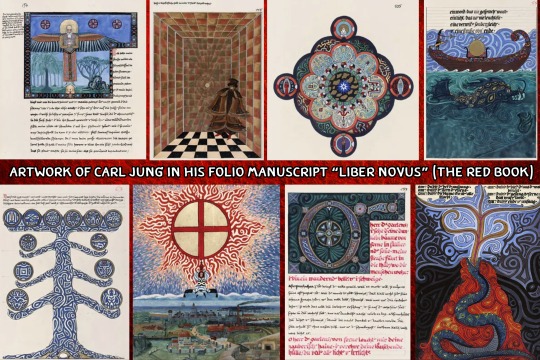
"The Red Book" by Carl Jung is a remarkable manuscript chronicling Jung's personal journey of self-exploration and encounter with the unconscious. Through handwritten text and intricate illustrations, Jung delves into his inner psyche using a method he termed active imagination, engaging with archetypal figures and symbols. Divided into sections such as Liber Primus and Liber Secundus, the book delves into themes of psychological duality, individuation, and spirituality. Published posthumously in 2009, "The Red Book" provides profound insights into Jung's inner world and continues to captivate scholars and seekers alike, offering a unique perspective on the depths of the human psyche and the quest for self-understanding.
#Jungian insights#uncharted#mind#psychology#shadow work#mysticism#Carl Jung#archetypes#synchron#symbolism#consciousness#psyche#duality#perspective#reality#controversy#anima#animus#spirituality#subconscious
5 notes
·
View notes
Text
Salt as the Arcane Substance
Carl Jung Depth Psychology Facebook Group
SAL
Salt as the Arcane Substance
[234] In this section I shall discuss not only salt but a number of symbolisms that are closely connected with it, such as the bitterness of the sea, sea-water and its baptismal quality, which in turn relates it to the Red Sea. I have included the latter in the scope of my observations but not the symbol of the sea as…

View On WordPress
#Alchemy#AnalyticalPsychology#Anima#Animus#Archetype#Buddha#Carl Jung#Christ#CollectiveUnconscious#Consciousness#DepthPsychology#Dreams#Ego#FairyTales#Freud#God#Individuation#Introversion#Jung#Jungian#Mysticism#Myth#Mythology#Persona#Psyche#Religion#Shadow#Spirituality#Types#CarlJung
11 notes
·
View notes
Text
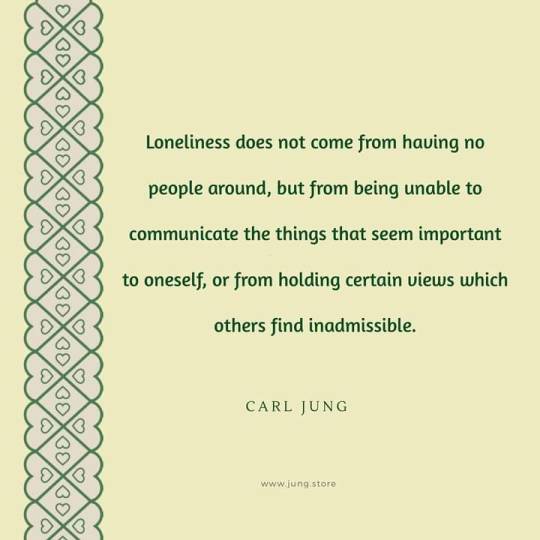
As a child I felt myself to be alone, and I am still, because I know things and must hint at things which others apparently know nothing of, and for the most part do not want to know.
Loneliness does not come from having no people about one, but from being unable to communicate the things that seem important to oneself, or from holding certain views which others find inadmissible. ~Carl Jung; Memories Dreams Reflections; Page 356.
#CarlJung#Alchemy#Anima#Animus#Archetype Feminine CollectiveUnconscious Dreams Ego Introvert Persona Shadow God Religion#Buddhism#Freud#Psyche#Types#Spirituality#Synchronicity
5 notes
·
View notes
Video
youtube
(via Face To Face | Carl Gustav Jung (1959) HQ - YouTube)
#youtube#Carl Gustav Jung#Carl Jung#Jung#Jungian#Psychology#Psychotherapy#Psychiatry#science#interview#Face to Face#John Freeman#archetype#persona#anima#animus#shadow#ego#self
0 notes
Text
-Profile xoxxoxo post in #passion:
I only know 10% of who you truly are and then I fill in the rest. It’s that 90% that I long for, the version of you that I have created in my mind because I am not able to get to know you in reality. I long for someone that does not exist. I long for the idea, potential, and fantasy of what could be.
---------------------------------------------------------------------------
My response to her post:
\/\/\/\/\/\/\/\/\/\/\/\/\/\/\/\/\/\/\/\/\/\/\/\/\/\/\/\/\/\/\/\/\/\/\/\/\/\
"If you put the woman that you are attracted to on a pedestal, what your really attracted to is your unconscious idealization of women... and men see their unconscious idealization of women in someone they are attracted to, especially if the attraction is pronounced and immediate, right… that's a projection psychoanalytically speaking... and then they confuse the woman with that idealization, which is very difficult to bear for the woman because she's not really there, that's the first problem... and second, she's going to get herself in trouble and not know it because now and then she's going to do something that violates that ideal projection and be called to account for it even though she doesn't know what rules she's breaking... plus, the guy won't be able to listen to her or appreciate anything about her that's not perfect or in accordance with that ideal… So, that means she can't really talk to him… right, she can't reveal anything that's untoward."
"…There's a loss in that too... like the loss is this is a loss of maturity is that... you know, if you are in love with your ideal, then you have the ideal… like you have the princess. The price you pay is you don't get the woman." -PhD Clinical Psychologist, Jordan Bernt Peterson
youtube
#the truth#anima#animus#carl jung#jungian theory#jungian archetypes#jungian psychology#psychoanalysis#sacrifice the ideal#for the women#collective unconscious#Youtube#mental illness#this post is going to stay at the top of my tumblr because you guys believe in online relationships#but we never know who is on the other end which could very well be a bot#my uncle in Florida dated a vietnamese women only to never see her face and supposedly “Dump” him#without ever knowing her for a year and a half#do not online date without knowing any person#you deserve better#it's probably part of the reason why I am single#in person relationships where it's at#protect your heart
0 notes
Text
Genuine question from me, a trans guy.
Why are so many current, self-identified Jungians super conservative and transphobic?
They hide behind ideas of the anima and animus as some kind of "proof" that trans and genderqueer people don't exist but tbh it's easier to argue the opposite, that the animus and anima are proof that we're all a bit non-binary and for some of us an aspect coult be out of keeping with sex assigned at birth anyway.
I wonder if some of them believe that archetypes are something immutable and in some way "proof" that the "natural order" is sticking to gender and other stereotypes, but when you look at archetypes from a more cross-cultural lens you can show that archetypes are fluid and ever changing.
It just reminds me of Jung's description of the dreams of former Nazis as becoming more escapist and filled with increasingly archaic traditionalist symbolism as a way to dissociate from trauma and cognitive dissonance?
But yes, interested in what other peoples' thoughts are.
#Jung#jungian psychology#jungian archetypes#gender#genderqueer#gender studies#transgender#lgbtqia#lgbtq#nonbinary#psychoanalysis#dreams#politics#psychology#transphobes#sexism#animus#Anima#conservatives#questions
0 notes
Note
Have yo read Captive Prince? What do you think of Laurent's character? Does he foil any other characters (besides being mind to Damen's heart)?
Hi!
Yes, I have and I love Laurent <3 He has the most complex arc and is at the centre of the major conflict, so he foils several characters, who are used to explore his personality and to progress his arc.
In general, I would say three major jungian archetypes are used in Laurent's story:
Inner Child = the childish and most vulnerable part of a person, which is influenced by one's younger years. Laurent's inner child is embodied primarily by Nicaise, but also by every boy abused and raped by the Regent.
Shadow = the repressed part, which the person doesn't want to aknowledge. Laurent has severals: the Regent himself, Aimeric and Jokaste. They all embody Laurent's most negative side.
Anima/Animus = the anima is the female side of a man and the animus is the male side of a woman. It is usually used in romantic subplots to show two characters growing closer. Here, it is embodied by the bond between Laurent and Damen.
Laurent's arc is one where he integrates with Damen, but to succeed he also needs to save his inner child and to face his shadow. Or to fail and try again.
BROTHERS AND LOVERS
Laurent and Damen foil each others' brothers:
Laurent foils Kastor: both are the unfavourite child, but Laurent adores Auguste, while Kastor resents Damen. At the same time, Damen perceives them in opposite ways. Damen initially doesn't aknowledge the good in Laurent, while he doesn't see the evil in Kastor. It is as Nikandros says. At the beginning of the story, Damen sees things in black and white. By getting to know Laurent he learns complexity and that the world is in shades of grey. He integrates his own heart with Laurent's mind. His own idealism with Laurent's wisdom.
Damen foils Auguste: both are strong fighters and beloved leaders, able to inspire others. The moment Auguste dies, Laurent loses his heart and it is only with Damen that he learns to trust and to open up again. It is also through Damen that he overcomes Auguste's death and his sense of inferiority, which is carefully nurtured by the Regent. Laurent is brilliant, but his arc is about showing vulnerability and find new faith in others. He integrates his mind with Damen's heart. His wisdom with Damen's idealism.
So, as you said, Laurent is the mind to Damen's heart and has to rediscover his own interiority. He needs to love himself again. Only by doing so he can truly escape the Regent and grow up. This process of growth is the main focus of the trilogy and it happens twice:
Laurent fails to grow in the second book
Laurent succeeds and completes his growth in the third book
Let's see how.
NICAISE AND AIMERIC = LAURENT'S DARKEST HOUR
Laurent's darkest hour happens at the end of the second book. This is common for a trilogy. It is not rare for the second installement to end in a negative way. Now, The Prince's Gambit doesn't end badly. Laurent and Damen win and grow closer. Laurent even frees Damen and they have sex for the first time. Still, psychologically, Laurent risks a huge brakdown because of Nicaise and Aimeric's deaths.
Nicaise and Aimeric are two parts of Laurent:
-Nicaise is Laurent's child-self. He is petty and capricious, but he cares deeply. And yet, he can't show any vulnerability. The moment he does, he is killed. Moreover, Nicaise plaids for Laurent because he deep down thinks the Regent won't kill him. This is true for Laurent, as well:
"I didn't think he's really try to kill me" Laurent said "After everything... even after everything".
-Aimeric is Laurent's shadow. He is a young man, whose life is defined by the Regent's sexual abuse. Aimeric confuses the Regent's imitation of love with true care and fights to get it back, even if it means hurting people, who truly love him. Unconsciously, this is true for Laurent too:
"You play his games like you want to show him you can. Like you're trying to impress him. Is that it? You need to beat him at his own game? You want him to see you do it? At the expense of your positions and the lives of your men? Are you that desperate for his attention? Well, you have it. Congratulations. You must have loved it that he was obsessed enough with you that he killed his own boy to get at you. You win."
Damen's speech to Laurent is basically the same one Laurent gives Aimeric. Aimeric shines light on this specific aspect of Laurent. Laurent too still loves his uncle. He too wants his attention and on some level thinks of his uncle as his only family:
"When you lost your brother, was there someone to confort you?"
"Yes," said Laurent. "In a way".
So, Nicaise and Aimeric embody Laurent's vulnerability. Nicaise is the child who still feels safe with the Regent. Aimeric is the young adult, who wants the Regent back. Both are Laurent. This is why Laurent wants to rescue them both. He grows close to Nicaise and tells him he will buy his contract and free him. He accepts Aimeric into his guard and refuses Damen's advice to send him away. And yet, the Regent uses them both against Laurent. He kills Nicaise and has Aimeric betray Laurent.
Laurent wants to help both Nicaise and Aimeric and the Regent tells him he can't. Just like he can't save himself.
According to the Regent's narrative:
Laurent is fond of Nicaise, but eventually leaves him alone out of selfishness
Laurent welcomes Aimeric in, but this is a blind spot that is used against him
By using vulnerable and abused kids, the Regent conveys to Laurent two messages. On the one hand Laurent isn't selfless enough to truly save anyone. He isn't good enough to be a protector like Auguste. On the other hand he is still foolish enough to trust others. He isn't smart enough to be a mastermind like the Regent. Too cruel and too foolish is how the Regent wants Laurent to see himself. So, that Laurent would feel trapped and cut others out.
And Laurent almost gives in, but is stopped by Damen:
"You tried to hurt me, and you have. I wish you would see that what you have just done to me is what your uncle is doing to you."
Damen goes through to Laurent and stops him from losing himself. He saves him from turning into a copy of the Regent.
THE REGENT
The Regent is Laurent's negative foil. He is who Laurent could become if he gave in to his worst instincts. As a matter of fact Laurent shares many similarities with his uncle:
Both are very intelligent master manipulators
Both are able to seize people's weaknesses and to use them
Both can be cruel and ruthless
Both tend to complicate things
This isn't by chance because the Regent does his best to break Laurent's heart and to warp his mind into a frailer copy of his own. He needs Laurent to think like him and to follow his rules, so that he can beat his nephew. This is why the Regent spends the years after Marlas by abusing Laurent in different ways.
The Regent's abuse has a double nature:
It has a sexual component: the Regent rapes Laurent multiple times as a child and shows possessiveness of him as a young adult. For example, many of his assassin attempts come with a sexual element. The assassins instructed to rape Laurent by using a drogue the Regent clearly used on his nephew as a child. Having Laurent and Damen sleep together, so that Laurent would eventually kill himself. Twisting Laurent and Damen's love story, as if to frame Laurent as dirty and despicable. Spreading voices about Laurent's supposed romantic feelings for Auguste. And so on...
It has an emotional component: the Regent keeps mentioning Auguste, which hurts Laurent in two ways. On the one hand it doesn't let him move on from his brother's death. On the other hand it drills into Laurent he isn't as good as the previous prince
"I hate to see you grown up like this," said the Regent, "when you were such a lovely boy."
The Regent basically blames Laurent for both growing up (physically) and not growing up (psychologically). He manipulates him by treating him as a child, while implying he isn't pure as a child anymore. The result is that Laurent hates himself.
This self-hate manifests itself in recklessness, suicidal tendencies and self-destroying behaviors. Like Laurent lashing out at others, when he is actually furious at himself. This is why specifically Laurent breaks Aimeric by using their shared trauma as a weapon. He hurts both Aimeric and Jord (who hasn't done anything, but being loyal to Laurent) because to truly face Aimeric means to accept himself and he can't.
Symbolically, Laurent kills Aimeric like he is slowly killing himself. This is why Aimeric's death happens after the reveal of Nicaise's murder by the Regent. Laurent kills Aimeric, just like the Regent kills Nicaise. Both victims are abused kids with frail and unstable senses of self, who deep down seek love and vulnerability. The lesson Laurent needs to learn is that he can't save the Nicaise within himself, if he doesn't help the Aimeric too. This is why it is important that Laurent is able to express empathy for Aimeric and to recognize he is a wounded person, just like Nicaise:
"Nicaise knew that when he got too old, he would be replaced."
"Like Aimeric," said Damen.
Into the long silence that stretched out between them, Laurent said: "Like Aimeric."
It is the first step to aknowledge his own hurt too.
AUGUSTE WASN'T GOOD ENOUGH
The second step is instead to face Auguste's ghost. Laurent's big brother is a double edged sword for the Prince. On the one hand Laurent deeply loves Auguste and is devastated by his dead. On the other hand his idealization of Auguste is unhealthy and leads to Laurent undervaluing himself.
These powerful contradictive feelings come to the surface in his "sparring" match with Damen. There, Laurent for once is able to show all his anger and grief. He lets it all out and is forced to accept he would have never been able to kill Damen in a fight. Still, another realization comes to the surface:
"I know," said Laurent, "that I was never good enough."
Damen said, "Neither was your brother."
"You're wrong. He was -"
"What?"
"Better than I am. He would have -"
Laurent cut himself off. He pressed his eyes closed, with a breath of something like laughter.
"Stopped you." He said it as though he could hear the ludicrousness of it.
Damen's words might seem cruel, but they are actually necessary because they break Laurent's internalised idolisation of Auguste. Laurent has been brought up with the convinction that Auguste is somehow better than him. This idea is present even before Auguste's death because of their father's favouritism. The early loss of his brother and subsequent abuse only makes this feeling stronger. Hence why Damen refusing this helps Laurent grow. Damen is the first one to see Laurent as his own person and to give him a choice:
Damen picked up the discarded knife, and when Laurent's eyes opened, he put it in Laurent's hand. Braced it. Drew it to his own abdomen, so that they stood in a familiar posture. Laurent's back was to the post.
"Stop me," said Damen.
Laurent chooses to give up on his revenge. He chooses his present relationship with Damen over Auguste's ghost. He starts wishing for something positive for himself. He starts caring for himself. He starts looking toward a possible future.
JOKASTE = OPENING THE DOOR
To reach this future Laurent has to face Jokaste, who is really another version of Laurent:
"You're lucky we're alike," Jokaste said, stepping down. She and Laurent looked at one another like two reptiles.
Not only that, though, she is Aimeric and Nicaise combined in a single character:
Like Aimeric, she betrays a lover for selfish reasons (apparently)
Like Nicaise, she is caught up in a power struggle and has to choose the side, which ensures her survival, even if it means negate her heart to do so
"You mean, the only difference between us is that I chose the wrong brother?"
As the stars began to drift across the sky, Laurent thought of Nicaise, standing in the courtyard with a handful of sapphires.
"I don't think you chose," said Laurent.
This time Laurent is able to see this. He empathizes with Jokaste and gives her freedom. He opens her the door:
"We're alike. You said that. Would you have opened the door for me? I don't know. But you opened one for him."
In this way Laurent understands the Aimeric he could not understand and saves the Nicaise he could not save. By the end, Aimeric (Jokaste) is shown mercy and Nicaise (her baby) survives. Laurent gives Jokaste and her family a future. And in this way, he symbolically gives himself a future and a family. He opens his own door.
THE TRIAL
The climax of the trilogy is Laurent's trial in Ios. This choice is interesting on multiple levels:
It is an inversion of the ending of book 1, where Damen is blamed for the assassination attempt on Laurent's life and Laurent protects him. In fatc, it is not by chance that Damen mentions the episode in his initial defense of Laurent.
It shows Damen and Laurent's integration. As a matter of fact Damen is the one who realizes Paschal has the key to dethrone the Regent. He is able to do so because through Laurent he has learnt to observe others, to understand them and to empathize with them. Laurent instead selflessly gives everything up for the person he loves and bravely faces off the Regent with no plan, but simply with his heart. The Regent tries to turn it into a weakness and to force Laurent to give it up, but fails. Finally, he and not Damen is the one who fights Kastor and kills him. He uses the skills he has learnt for his revenge and uses them to protect Damen, instead. He chooses life and love over death and hate.
Most importanlty, though, the trial starts as a farce, but by the end it becomes a fair administration of justice, which punishes the criminal and recognizes the innocent. Let's see how this change happens.
NICAISE = VICTORY
Laurent wins not because of his mind, but because of his heart. Specifically, he wins because of the relationships he builds and of his ability to empathize with the humblest people, those nobody cares about.
First of all, Laurent obviously wins thanks to Damen. It is Damen choosing him over his kingdom that makes it possible to the tides to turn. So, it is because Laurent overcome his internalized hate for Damianos and slowly comes to accept and love him, that he is saved in the end. In a sense, the night where he has to choose if to let Damen die or to save him out of loyalty in volume 1 is when Laurent chooses who he wants to be. He can let a man he hates die without risking anything, like the Regent would. Or he can save that man our of a sense of fairness, like Auguste would. Laurent chooses the latter and makes the first true move towards his victory.
Secondly, Laurent is able to touch the councilors' sense of morality thanks to Loyse, Aimeric's mother. She reveals that her husband basically sold Aimeric to the Regent in exchange of power. She also explains how the Regent conspired with Kastor to kill Theodemes. This testimony isn't decisive because the assassination of Theodemes is a matter of Akielos. Nonetheless, Loyse re-opens the trial and gives importance to Aimeric's story and pain. It is also important that she is a woman because the Regent hates women. She is the character nobody considers, as everyone is focused on Guion's, the powerful councilor. And yet, Laurent does and convinces her to break free from her husband influence for the sake of her son.
Thirdly, Laurent is saved by Paschal's testimony. That said, Paschal is only able to reveal the truth about the Regent's murder of the King only because of Nicaise. In general, Nicaise is a character, who ends up being important in the finales of all three books:
In book one, Nicaise goes to Laurent's apartments after the attempted murder. He is clearly worried and can't decide if to openly switch sides and tell Laurent the truth or not. He also appears to tell Laurent goodbye and to give him his earrings. Symbolically, Laurent is saying goodbye to his younger and most innocent self, as he prepares to enter war with his uncle.
In book two, Nicaise's death is revealed in the climax and it leads to Laurent's decision to march on Charcy. It also kickstarts Laurent's deepest psychological crisis, as he struggles to keep a clean mind and shows how deep he is hurt and desperate.
In book three, Nicaise is the one who indirectly hands Laurent victory, as it is him who stole Govart's papers and gave him to Paschal.
In other words, Nicaise is the one who leads to victory, which fits his name. As a matter of fact Nicaise means "victorious", the person who brings victory and he delivers.
Thematically, this is very important, as Laurent initially regrets to have grown close to Nicaise:
"I killed Nicaise when I left it half done. I should have either stayed away from him, or broken his faith in my uncle. I didn't plan it out, I left it to chance. I wasn't thinking. I wasn't thinking about him like that. I just... I liked him."
He believes that because of their sibling-like bond Nicaise is now dead. He believes his influence isn't enough to break the Regent's control over Nicaise. And yet, it is precisely because of Laurent's love and care for Nicaise that the boy is able to rebel himself enough to steal key documents and to hand them to Laurent's side. Nicaise dies tragically, but his life and Laurent's kindness to him are not in vain. They change the destiny of two kingdoms. Laurent isn't able to save his child-self, but his child-self is strong enough to save him. Just like Laurent might not cancel what happened to him in the past, but can still move forward:
"Stop it, you're hurting him. You're hurting him. Let him go." A soldier was holding him back, and the boy was fighting him.
Laurent looked at the boy, and in his eyes was the knowledge that some things couldn't be fixed. He said, "Get that boy out of here."
The new Regent pet once again mirrors a part of Laurent. The side of him that still sees the Regent at family. And yet, Laurent is finally able to accept this part of himself, but is strong enough to start healing. Just like as King he has now the chance to help as many children as the Regent hurt. Laurent ends is arc by growing up. He isn't a child anymore:
"You think you can defy me?" the Regent said to Laurent. "You think you can rule Vere? You?"
Laurent said, "I'm not a boy anymore."
He isn't a boy anymore, he can't be controlled by the Regent anymore. He can now start a new life as his own person, free from the Regent and from Auguste's ghost. A life of love and new relationships.
#the captive prince#captive prince#laurent#damen#damianos#the regent#aimeric#nicaise#jokaste#my meta#the captive prince meta#asksfullofsugar#anonymous
206 notes
·
View notes
Link
10 notes
·
View notes
Text
The Ones Who Found The City
Ursula K. LeGuin's "The Ones Who Walk Away from Omelas" is a classic short story, and obviously I knew of it, but I'd never actually read it until recently. Well, I finally got around to it, and as many timeless classics do, it got stuck in my brain. This story is my - response? homage? sequel? pale imitation? - to it. I suggest you go and read "The Ones Who Walk Away from Omelas" if you haven't. Not because it's actually required reading for this story - I think it stands on its own more or less okay - but because it is a classic for a reason.
---
Initially, no one is quite certain of what they’ve found when the Animus breaches the next manifold layer. This is in and of itself expected, of course. Exploring psychspace is by its very nature an unpredictable venture. Each of the various infinite layers is unique and bizarre in its own way, reflecting the archetypal underpinnings of an entire species present, past, or future across an infinitude of possible realities. The crew of the Animus, therefore, has seen things so utterly alien and inexplicable that only the rigors of their training and the care put into their psychic warding saved them from insanity.
It is somewhat disappointing, then, to find that this sub-domain is just a city. Definitely not Terranic, certainly not, but still following the Terranic modality, with no more than a seven-degree quantum drift.
“Towers,” Thromby says into the recorder as they sit at their post at the nose of the Animus’s command center. “Following the standard skyscrape pattern. Unclear if they’re domiciles or business centers or both. Coastal city, bay appears to be oceanic rather than lake. Pleasing blend of urbanization with natural setting.” They glance at Vigil. “Anything on the lifescope?”
Vigil shakes his head. “Nothing. It’s empty. Totally empty.”
“That’s odd,” Katrina speaks up from the helm. “The city doesn’t show signs of decay or reclamation by nature.”
“Entropy may not work in the usual way in this sub-domain,” Teasha reminds her. “The city itself could be the natural growth, reclaiming the artificial countryside. We’ve seen things like that before.”
Thromby feels Katrina’s unconscious bristling at the subtle reminder that she is the newest member of the crew and thus less experienced in the vagaries of psychspace than everyone else. Next to Vigil, who is only nineteen, she is also the youngest. “I would expect,” Katrina says, her voice cool, “that in a sub-domain so obviously based on human archetypes, entropy and nature-versus-civilization tropes would function more or less as usual.”
“I’m certain you would,” Teasha replies, her voice equally cool. “When you’ve been at this as long as me and Thromby, you’ll learn better.”
“Enough of that,” Thromby says before Katrina can reply. They love Teasha, but she tends to be too harsh on new crewmembers. A defense mechanism, they know, to insulate her from the all-too-common pain of losing them. But Katrina has too much to prove. The clash is natural and to be expected, and even useful at times, but now is not one of them. “Vigil, get me readings on atmosphere, microbiome, and psychic radiation, if any. Katrina, pick a spot on the coast and bring us down there. I want to see if the ocean is actually an ocean or a liminality representation. Teasha, get the Animus tuning to this sub-domain’s resonance frequency. I don’t want any dissociation issues.”
The orders are mostly unnecessary, since everyone already knows what they’re about, but they serve their intended purpose, which is to re-focus everyone on the task at hand and redirect their nervous energies, particularly Katrina’s. Thromby still isn’t sure she’s going to make the cut after this expedition is over, but there’s potential there. They would be foolish to ignore someone with Katrina’s strength of identity grounding.
There are plenty of sub-domains out there where it’s useful to be entirely certain of who you are, and not everyone can be.
---
The first day’s worth of exploration yields more questions than answers, which is normal and expected. Thromby is indeed certain that Katrina’s initial assumption that this is a human-archetypal sub-domain is correct. Human atmosphere, human shadow- and ontological concepts, Terranic fish in the very-real ocean. But the iconography is sparse and mostly nonsensical. It’s clear that the city was able to actually function as a city, but it feels purposeful, designed, in a way that actual cities outside psychspace rarely do.
“It’s a metaphor,” Vigil says as they sit around a campfire on the beach after the first day.
“Well, obviously,” Katrina agrees, and Vigil lights up – both visibly and psychically – at her concordance. Thromby knows Vigil has been nursing burgeoning feelings for Katrina since she joined them, and has so far seen no need to make anything of it. “But a metaphor for what?”
“We don’t have enough data,” Vigil replies. “But I’m certain of it. We just need to keep exploring.”
Thromby takes a bite of the fish they’ve been roasting over the fire. It’s a pleasant change of pace to be able to eat something real, instead of the platonic nourishment suggestions dispensed by the Animus. “Agreed. I’m curious to see what the point of this place was. We have five more days before we have to resurface and the expedition has been quite successful already. I think we can spare the time. Teasha?”
Taking a bite of her own fish, Teasha purses her lips as she chews. “I concur, but I’m uneasy.”
Teasha is their psychometry specialist, so this makes all of them sit up a little straighter. “Are we in danger?” Katrina asks.
“Of course we’re in danger, we’re in psychspace. But in this particular sub-domain? Metaphorical danger, as Vigil says. Ideological or memetic patterning rather than physical.”
Thromby nods. “I suspected that might be the axis of it, here. We will need to split up to cover the necessary ground in the time we have left, so everyone stays in contact while exploring. Mechanical and psychic. No exceptions.”
None of them are particularly happy with this pronouncement, but they see the wisdom of it. It’s distracting and somewhat draining to keep a four-way psychic connection going, especially over distance, but their implanted transceivers sometimes don’t function properly, depending on the sub-domain. Electromagnetism and causality both seem to be standard here, but such things have been known to change in an instant depending on whether the sub-domain is actively malicious or not.
Thromby doesn’t feel any such malice here, though. That doesn’t mean it isn’t present; such things are often quite good at hiding themselves. But they’ve been exploring psychspace for seventy-eight years subjective. They’ve learned to trust their instincts.
---
Two more days of exploration are frustratingly unrevealing. The city is the size of a proper metropolis, and they know it will be impossible to actually explore any significant percentage of it in only a few days, but Thromby is still irritated by their lack of progress. They find evidence of cultural signifiers, rituals, and traditions, but again, the iconography is vague and appears opaque to standard Jungian-Jingweian analysis.
Teasha spends the two days on a different investigative track than the rest of them. “Psychometrically speaking the city is remarkably healthy,” she said on the morning of their second day. “Most locations, metaphorical or otherwise, bear the echoes of trauma or strife, but this place seems to have been almost entirely peaceful. Totally voluntary anarcho-communism or ordnung-socialism, perhaps, without the usual markers of systemic violence inherent to capitalistic or fascistic systems. But there’s a thread somewhere that I keep detecting the edges of.”
“A thread of what?” Thromby asked.
“Pain, of course.”
It is on the evening of their third day in the city that Teasha calls them to her. She uses their transceiver link rather than a psychic summons. “To avoid contamination,” she explains. “I’ve found the source of the thread. Double your usual wardings and enter seclusive patterning before you come inside.”
Thromby does so, of course, though they dislike cutting themselves off from their extrasensory perception. It feels like trying to see with only one eye. When they arrive at Teasha’s location, however, they immediately understand why she insisted on it. The possibility of psychic contamination here is very high.
“What is this?” Katrina asks, holding her nose in disgust.
“The point of the metaphor, of course,” Teasha replies. She indicates the filthy cellar in which they’ve found themselves, the only part of the city so far that has seemed actively decrepit. “I guarantee you that even if we spent the rest of our lives exploring this city we would find only this one place showing any signs of entropy.”
The cellar stinks of excrement, a combination of ammonia and fetid shit, despite the physical processes creating such smells having terminated long ago. The floor is dirt. There are no windows. In one corner there are two mops, their heads stiff with drying waste, and a bucket, the metal bands around its circumference orange with rust.
“They concentrated all of the city’s entropy into a single space?” Vigil asks.
“Not entropy,” Teasha tells him. “Cruelty.”
Katrina gapes, her hand falling away from her nose for a moment. “Come again?”
“Something lived here,” Teasha explains to her. “Or, more precisely, was forced to live here. It functioned as a psychic magnet, of sorts. The functioning of the city relied entirely upon its imprisonment and use as a scapegoat.”
“What was it?” Vigil asks.
“One of the innocence-sacrifice archetypes. An animal or a child. I suspect a child; an animal can feel pain and misery, certainly, but it doesn’t conceive of injustice in the same way a child does.”
Thromby feels their stomach turn a little. “Ah. I see.”
“See what?” Katrina demands.
“The point of the metaphor indeed,” Thromby replies. “This entire city and all its inhabitants, predicated on the suffering on a child. It’s a morality construct, and a good one, too.”
“A good one?” Vigil asks. “It’s grotesque.”
“Your deontological leanings are showing,” Katrina tells him. “From a utilitarian perspective it’s perfect. Nothing exists without imposing an energy burden on the system in which it exists. Even the nourishment suggestions the Animus feeds us in liminal space between manifolds is distilled from universal krill. But this? The concentration of all of a society’s utility burden onto a single individual. The ultimate maximization principle.”
“And your teleological leanings are showing,” Teasha sniffs. “You’re missing the point of the metaphor entirely, Katrina. It isn’t about utility. It’s about cruelty. The cruelty is the point.”
Katrina’s nostrils flare and Thromby cuts in before she can start really arguing. “Enough,” they say. “A conflict here in this space could be dangerous. We’re at the focus of the sub-domain and things have a way of rippling. We’ve discovered the point of the metaphor, so we can go back to the Animus and leave in the morning.”
Both Katrina and Teasha look ready to argue the point with them, but then they master themselves and both nod.
“Do we have to wait until morning?” Vigil asks, looking around the cellar in transparent disgust. “I would prefer to leave sooner rather than later.”
“You know the rules,” Thromby replies. “We don’t transit without everyone being rested. A tired mind is a vulnerable mind.”
Reluctantly, Vigil nods, too. The four of them walk away from the cellar, their thoughts opaque to one another.
---
Thromby is jolted out of sleep by Teasha screaming.
They sit bolt upright and look down at Teasha in the bed next to them. She is clutching at her head, shaking, writhing beneath the sheets. “Teasha!” Thromby snaps. “Focus! Center yourself!” They grab her by the wrists and pry her hands from her face; her nails are leaving bloody marks in her skin.
“Too much, it’s too much!” she shrieks. “I’m lost!”
Thromby forces their way into her mind. She previously gave them her consent for this, knowing that it might be necessary in a moment like this one. What they see there –
“Aquinas,” they say aloud. The implants in Teasha’s cochlear nerves pick up on the trigger word and activate, sending the kill-signal to other implants deeper within her brain. She stops screaming and slumps, unconscious, temporarily brain-dead. When Thromby says the word again she will be switched back on, but for the moment she is safe from the psychic contamination that was attacking her along her psychometric vector.
Which, of course, means that Thromby has to deal with this issue alone.
They dress quickly and exit the Animus into a beautiful summer day. Pennants and banners wave atop the rigging of ships in the harbor, bells sound from the city, and people, so many people, cavort and revel on the beach, in the waves, in the streets. There is laughter, merriment, the intoxicating psychic swell of happiness and excitement. Thromby threads their way through the crowds in the streets – mothers carrying their infants, children running through the streets in elaborate games of some variation of Terran tag, huge parades of horse-drawn carts with animalistic balloon totems floating in the air above them. Vendors call out to Thromby, offering delicious food, intricately made jewelry, amazing clockwork-mechanical toys, sensory-enhancing drugs, and a thousand other variegated temptations. Street musicians play upon cunningly crafted instruments – strings, pipes, percussion, keys – and revelers cavort to the tunes.
Thromby can feel the bright sparks of all of these people in their mind. These are real, thinking, feeling beings. They belong to the metaphor, certainly, but Thromby could speak to them, touch them, verify their self-consciousness and interiority, even invite them to come and join them onboard the Animus and explore psychspace. They could bring them up into the real, return home with them, have a life with them. That is how it has to be, of course. Thromby knows they themself may belong to a different metaphor of a different order, after all. The real is only real because enough people agree it is.
But they do none of these things. They just walk, stolidly, back to where they know they have to go.
Katrina is waiting for them outside the cellar, barring the way in. Thromby has their wards up at triple strength and has been in seclusive patterning since before leaving the Animus, but they don’t need to be psychic to read her mind. Everything she is feeling and thinking is there in plain sight – the proud and defiant way her chin is thrust out, the blaze in her eyes, the way she has her arms crossed and feet at shoulder width. She is ready to fight.
“Let me through,” Thromby says without preamble.
“No.”
Well, that’s their respective positions, Thromby thinks, articulated clearly and easily enough. “Why not?” they ask.
“Vigil consented.”
“Vigil is in love with you and you know as well as I do that consent is a matter of framing,” Thromby snaps. “Move.”
“No. I explained everything to him and he consented. It has nothing to do with whatever feelings he might have for me.”
“That’s bullshit and you know it, but fine. For the sake of argument, tell me how you explained it.”
Katrina hesitates, and Thromby can tell she wasn’t expecting them to actually offer her a chance to proselytize. “The point of the metaphor is that no matter how great and beautiful the society, if it’s predicated on cruelty, it’s unjust,” she says. “Deontological thinking, obviously, but cruelty is by definition nonconsensual. I explained to Vigil that if he allowed it, we could collaboratively put blocks in his mind, purposefully regress him to a childlike mental state, and put him in the cellar to suffer for a specific length of time. Then we can pull him back out, remove the blocks, and even erase the memories of the trauma. The child-Vigil won’t, can’t, consent, but it also won’t exist for more than a day, and pragmatically speaking never will have.”
Thromby massages their temples. “Congratulations. Once again, you have missed the point of the metaphor.”
“Damnit, Thromby, I’m not a child! I have the same training and grounding in theory that you and Teasha do. Everything I’m doing is teleologically sound, and Vigil agreed that with the steps we’re taking –”
“You’re trying to outsmart it,” Thromby cuts her off. “That’s how I know you’ve missed the point. You can’t outsmart this, Katrina. There is no perfect set of circumstances you can construct to get around the simple fact that this city functions, exists, because of deliberate and terrible cruelty. That’s the entire point of it, just like Teasha said. Teasha, who, by the way, is currently in a coma. I had to put her into it to keep Vigil’s misery from damaging her.”
“It’s a thought experiment,” she argues, obviously not addressing the point about Teasha because she knows she won’t win that argument. “There’s always a correct answer for them. The trolley, the Gettier, the –”
“It’s about fucking sin,” Thromby sighs.
“Are you joking right now? You’re going back to the religious well?”
“Yes, because that’s what’s happening right now. The city is a sin, Katrina. The excesses of its beauty, its wonder, its perfection, are obscene precisely because of how and why they function. It’s rooted in the ideology of disgust and taint. Utility, teleology, all of these justifications and rationalizations exist and have their use, but at the end of the day, answer me one question: will you trade places with Vigil?”
Katrina hesitates.
It’s only a bare moment, less than a second, even, but it’s there. And Thromby sees it, and Katrina sees it.
“Yes,” she says, finally.
“I knew that would be your answer. But you know that the answer doesn’t really matter, does it?”
Katrina lowers her head. “No.”
“You know why you hesitated.”
“Yes.” She looks back up at them. “But – there’s no such thing as absolute morality, any more than there’s a single objective reality.”
“Of course there isn’t. And yet, you hesitated.”
They just lock eyes for a few seconds. Then she lowers her gaze again. “And yet, I did.”
Thromby steps past her and opens the cellar.
#writing#my writing#story#short story#short stories#creative writing#omelas#the ones who walk away from omelas#ursula k leguin#leguin#science fiction#sci fi#sci-fi
165 notes
·
View notes
Text
Judai and Yubel's Chemical Wedding
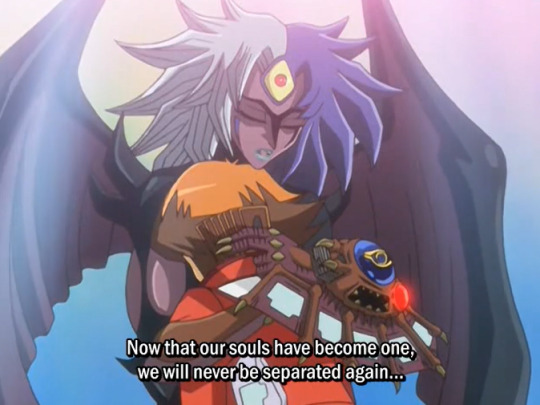
A chemical wedding is central to many alchemy stories.
A chemical wedding is a reconciliation of opposites, often with the most significant character relationship to the protagonist. A relationship which destroys and then remakes them in the better version of themselves.
Jung said that relatioships are chemical reaction. If you have a reaction you can never return to your previous state of being. That's ultimately the role of a chemical wedding in a story. A relationship which is central to a character's development, and changes both parties.
Yubel isn't just important for Judai's character development, they're literally his other half and their union of opposites completes them both in an alchemical sense. Keep on reading below the cut for a lesson in alchemy symbolism.
Peter Pan's Missing Shadow
So, the story goes somewhere in the middle of developing season two the writers recognizing that Judai, would never be able to handle a Marik level antagonist. He lacked maturity compared to the previous series protagonist Atem. The concept of Yubel emerged to make Judai grow, because as he was, he wasn't enough.
Judai fits the archetype of the hot-blooded shonen protagonist almost perfectly in the first two seasons, but even in two seasons where he changes very little as a character the hints are there.
Sho immediately puts Judai on a pedestal, and soon so does everyone else. Judai is praised for his pure heart over, and over. The standards for Judai are set so high you begin to wonder what if Judai wasn't the person everyone sees him as?
At this point is it even Judai that his friends are seeing?
What does that do to a person's identity when everyone around you is love with the idea of you. When you're not seen as a person with flaws.
Judai doesn't grow but how can he, when he's not really allowed to make mistakes. When he's expected to always be cheerful, and always bounce back without help or support.
Judai is pure of heart, but is anybody really pure? The light always casts a shadow.
Jung pioneered a lot of analytical psychology theory. Jung divided the psyche into four parts, the persona which is how we externally engage with the world our public face, the animus and anima masculinity and femininity, and finally the shadow.
Complementary to Jung’s idea of the persona, which is “what oneself as well as others thinks one is” [CW9 para 221], the “shadow is that hidden, repressed, for the most part inferior and guilt-laden personality [...] that is his shadow does not consist only of morally reprehensible tendencies, but also displays a number of good qualities, such as normal instincts, appropriate reactions, realistic insights, creative impulses etc “
The shadow isn't made up of bad qualities, just what we are afraid to show others because of judgement. Hidden as it may be, the shadow is a fundamental part of your personality.
Jung had a deep interest in the shadow – its form and content – and in the process of assimilating “the thing a person has no wish to be” [CW16, para 470]. He saw quite clearly that failure to recognize, acknowledge and deal with shadow elements is often the root of problems in relationships.
Is a friendship with someone real if you're afraid to show any of your flaws?
Juda's never allowed to make mistakes around his friends. He's under constant pressure to fight their battles, to fear he might lose them if he loses.
Ryo, a foil and rival Judai suffers a complete breakdown after losing just one duel. Before that he spelled it out for Judai in the graudation duel, the "perfection" everyone expected limited his growth, until he finally fell apart. If one loss makes Ryo fall then how much farther does Judai who's under more pressure have to fall?
Judai hides his shadow from everyone, but the shadow isn't just a part of you. The shadow is you. You are your shadow. Which is why recognizing the shadow is a critical part of growth - and alchemy. As Jung once said, "The gold is in the dark. And one does not become enlightened by imagining figures of light, but by making the darkness conscious.”
Judai's in unable to grow up, because like Peter Pan is missing his shadow. It needs to be retrieved and sewn back to his feet. Until then, he's stunted and missing an important part of himself.
Judai is missing something important without his shadow. I'm not pulling this from thin air, it's directly stated by the text repeatedly.
Here.
Kouji Satou: We have something that you lack.
Judai: That I lack?
Kouji Satou: Yes the darkness of the heart that slumbers deep within a duelist. The burden that a duelist bears in his heart. Judai, you have none of that.
Here.
Cobra: You are certainly a talented duelist. But you have one fatal flaw.
Judai: A fatal flaw?
Cobra: Yes, your duels are superficial. Someone who fights with nothing on his shoulders, cannot recover once he loses his enjoyment. What a duelist carries on his shoulders will become the power that supports him when he’s up against the wall!
Cobra: But you have nothing like that! Those who go through life without anything like that cannot possibly seize victory.
Cobra: But I know that nothing I say will resonate with you… because you have nothing to lose but the match.
Even, by Judai himself.
Judai: They’re all… They’re all gone. There really was something missing in me. But what is it? What was missing? What should a duelist burden themselves with?
I often worry people will misinterpret Judai's ending with Yubel is unhealthy because he's "caving to the demands of a stalker."
Yubel's not a stalker, they're not even a real person. Judai's a character in a story, experiencing an arc about learning to accept and grow path his worst flaws. How could that arc end with throwing away Yubel, who represents the ugliness Judai tries to hide?
Yubel is Judai's shadow, run away from him just like Peter Pan. Yubel's more than just a cast-off shadow though, Yubel is Judai. A good example of two separate characters coded as each other's shadows in other literature is Katherine and Heathcliff, two characters designed specifically to be two halves of a whole. Katherine once said, "I am Heathcliff", or to be specific she said:
My great miseries in this world have been Heathcliff’s miseries, and I watched and felt each from the beginning: my great thought in living is himself. If all else perished, and he remained, I should still continue to be; and if all else remained, and he were annihilated, the universe would turn to a mighty strange: I should not seem a part of it [...] Nelly, I am Heathcliff!
Katherine - Wuthering Heights
So these are two different topics, shadow as a literary foil, and shadow as an aspect of peresonaity in Jungian psychology, yubel is both.
Yubel is the archetypal shadow character, a character who challenges the main character by being their internalized flaws made external.
In a Jungian text when a character won't look at their shadow, they're often forced to look by being confronted with an externalized version of their shadow.
This is the first line of dialogue Yubel says that's not chanting Judai's name in episode 117 to Amon.
Yubel: My power is not especially great. But those with darkness in their hearts can unleash great power in me.
Yubel: The pus welling out of your injured heart forms a second heart. I can see that other heart. The darkness in it.
Yubel: That's right. That is the darkness of your heart. it's there, in the depths of your mind. Th scream of your other heart, born from your stagnant blood!
Yubel's go-to strategy with manipulation is to throw in a character's face the secrets they've been hiding to make them more liable to their will. Until Yubel can reconstitute their own body, they're forced to act entirely through others, possessing Cobra, then Martin, and finally Johan.
Yubel, the runaway shadow can't exist in this world without glueing themselves onto someone else. Can't be whole without Judai.
Yubel: You'll formally become king.
Yubel: It must be great to have your wishes come true. But then, who's going to be happy for you?
Yubel: Living in a way that suits you. The one who'd be most happy for you would be that "echo" woman that you loved, am I right?
Yubel: But you went and let her die. You won't even be able to see her celebrate, isn't that a bit weird to you?
Amon: Silence...
Yubel: I know I couldn't stand it. A world without the one I love. It's because of Judai I can feel pain, angiush, and agony.
They say it over and over again, a world without the person you love, even a perfect one like Amon imagines, isn't worth living in.
Yubel: I wouldn't want to live in such a world!
Yubel: The world is a place that you make alongside the one you love! What Judai and I make together... that will be the world!
It seems like a one-sided dependence on Yubel's part, but because Yubel is Judai's shadow, Judai cannot exist without them either.
Yubel was literally introduced into the story to spur Judai's character growth after two seasons of stagnation.
Judai seems better off without Yubel. Judai even suggests as much, that it might have been better for Yubel to die in that crater, than crawl back to Judai in their wounded and hateful state.
It seems that Yubel's reapperance triggered Judai's breakdown, and without it the breakdown never would have happend. However, there's two seasons of foreshadowing that JUdai is "missing something" without Yubel, which is why they can't grow or adapt to new circumstances. Judai needed to go through a death of his old self, a loss of innocence to become someone new, that's how alchemy works, that's how growing up works.
JUdai needed to reintegrate his shadow (Yubel) so he could become aware of his flaws, and while he does hit a low point, in the aftermath he can finally better himself.
The question is what flaws of Judai does Yubel reflect?
At first brush they seem as opposed to each other as hero and villain.
There's a tragic symmetry to the way both of them lived their lives for the past ten years. They began in the same place, Judai's childhood was just the two of them together. Then Yubel drove all of Judai's friends away, and Judai sent Yubel away in return.
Ten years go by and Judai attends Duel Academy and makes friends for the first time. He learns of his destiny was the one to protect Neo-Space and the Neo-Spacians led him their power helping awake within him the power of the gentle darkness. Judai spends almost two years almost always surrounded by people, alone in the center of a crowd.
At the same time Yubel has spent the past ten years alone in space, crying out for help from Judai. When they finally return to earth they ask for help one final time only to be met with silence. In that moment Yubel decides that silence is their answer, that abadoning Yubel, ignoring their screams of pain and forgetting them was all Judai's way of showing love.
Judai awakens his powers of the gentle darkness, whereas Yubel is corrupted by the light of destruction. Judai receives the help of everyone around them, Yubel only survives by manipulating several people to eventually crawl their way back to Judai.
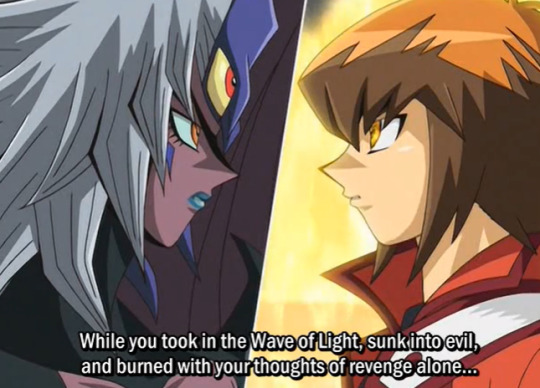
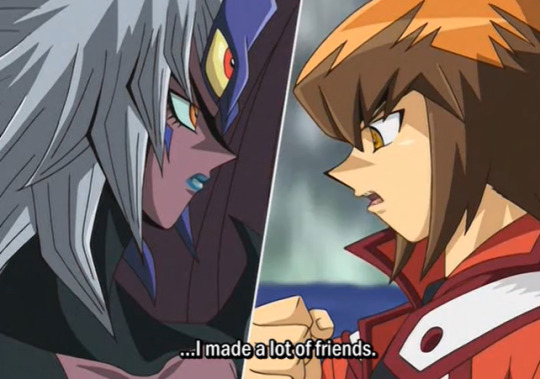
They started at the same point, but by the time they meet again they're completely unrecognizable to each other.
As easy as it is to see them as villain and victim you can flip their roles too. As Judai is responsible for the chain of events that led to Yubel's torture, from Yubel's point of view they are the victim and Judai the villain.
It's unfair to hold a decsion they made when they were five against him. However, abandoning Yubel is a choice Judai continually makes, even after learning Yubel's undergone ten years of torture they were responsible for.
Judai: Yubel didn't come into being by coincidence. I made them who they are.
Judai continually ignores Yubel to search for Johan. However, he's not responsible for Johan. Johan made the choice to sacrifice himself. Wanting to save Johan isn't bad of course, but wanting Johan back is about what Johan represents to Judai not who he is as a person.
Yubel rightfully points out Judai will go so far to save Johan, but won't lift a finger to help them.
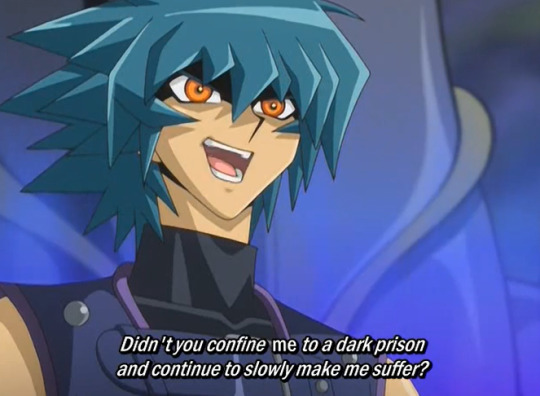
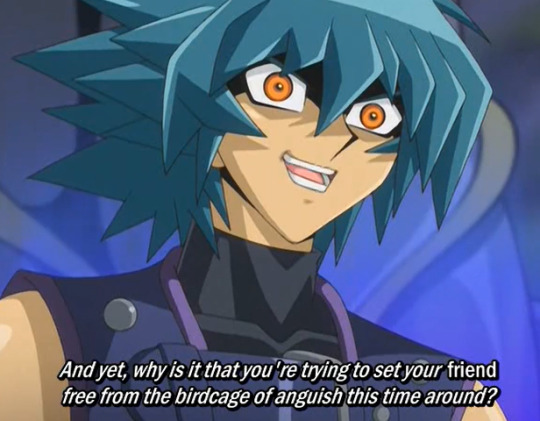
In fact Judai's obsession with Johan, is a narrative flaw (one Yubel reflects for the audience). It leads to his destruction.
Sho even calls him out, his willingness to sacrifice anyone, including his friends for Johan's sake. It's selfishness on his part. To quote this post:
The way he goes after both after Johan in season three and O’Brien shows that he actually doesn’t care all that much for them as people. To him, they represent a concept: Victory, or at the very least atonement for his past actions. A convenient way to right what he did wrong.
That is not to say that he doesn’t like them as people - he does. But when the chips are down, what he ultimately wanted was a chance to redeem himself by saving them.
Yubel's obsessive pursuit of Judai to the destruction of everyone else, reflects Judai's obsessive pursuit of Johan destroying his friends.
To quote the above post again.
Yubel is a deeply selfish person as well. However, it’s a different kind of selfish. Yubel has exactly one priority: Juudai. Anyone or anything that isn’t Juudai doesn’t matter, and Yubel will go after Juudai no matter the situation and no matter the consequences.
They're both two deeply selfish people and Yubel is needed to cast a light of this selfish side of Judai. When the two of them are compared though the image blurs, Yubel doesn't have the right to take their pain out on Judai's friends, but Judai goes on to later do the same thing.
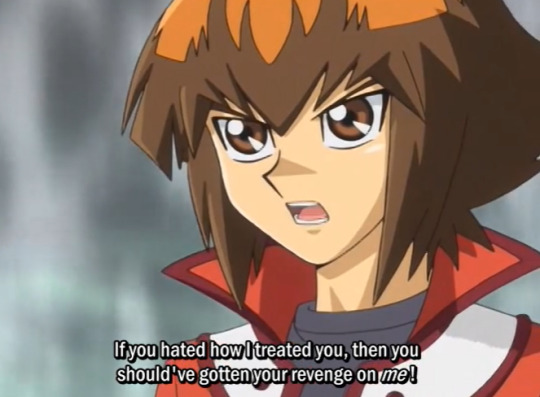
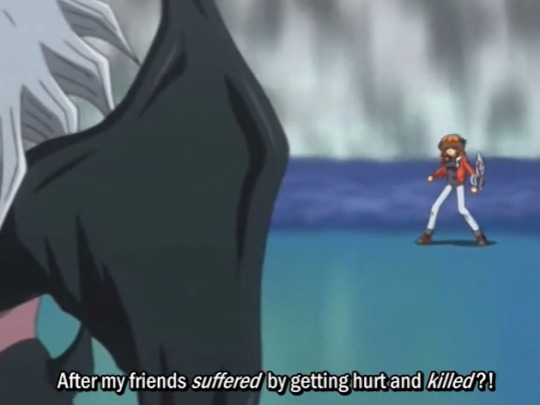
"But then that's the nature of love, isn't it? I wanted all that torment to convey the depth of my love."
Judai rightfully calls out Yubel's involvement of innocent people, but it's hypocrisy on his part. He doesn't have the moral high ground here. Yubel's suffering doesn't entitle them to take out said suffering on Judai's friends, but Judai also slaughtered innocents as the supreme king.
Judai framing Yubel's reaction as revenge is ignoring his own flaws and role in things. Sharing pain = understanding = empathy for Yubel. Yubel wants to be understood, but Judai wants to ignore his shadow.
Yubel's strategy is a kid of forced empathy - to drag Judai down to their level and make Judai understand the same pain so Judai will understand them.
I'm going to quote another post again, this post here.
In her desperation to grasp why she was being made to suffer if Judai loved her, it makes a certain amount of sense that she would latch on to the suffering itself as being something Judai wanted for her. (She knows and admits this isn’t true, btw, but it’s the only thing that allows her even a tenuous grip on sanity) Then, when she was in a position to meet him again, her own views on love would allow her to subconsciously justify making him suffer the same way because her pain had left their life experiences too disparate to form a meaningful connection once more.
And the hilarious thing is that she was ultimately right? Yanking Judai down to her level is what allowed Judai to understand her in a way that was impossible before he had his own little fit of love-induced murder spree.
I think what people sort of miss is that what Judai is reviling her and calling her an unfeeling monster near the beginning of their duel, he’s the one that’s wrong.
This symmetry they eventually reach where they both become perpetrators shows the biggest thing they share in common: trauma, and how they react to it.
Trauma comes to define both Judai and Yubel, but they react in different ways.
Yubel externalizes their trauma, the same trauma Judai hides internally. What Judai conceals, Yubel by acting out their grief on others reveals.
Yubel wears their heart on their sleeve for all intents and purposes. They will act out their pain on others, gleefully, sadistically so. Their entire philosophy of love revolves around the idea that intentionally inflicting pain as a show of love.
However, as stated above that's a coping mechanism. When Yubel says they want to share pain with Judai, it's not revenge, it's a desire for empathy and understanding. Yubel wraps themselves in a blanket of love, to endure years of torture they suffered alone.
Yubel can't just ask for Judai's love though, they demand it.
This too is Yubel shielding themselves, they're coping with their abandonment trauma. Yubel can endure any pain inflicted on them if they convince themselves that Judai still cares, they can crawl out of a crater if it might lead them back to Judai. If Judai rejects them however, they completely fall apart.
Judai too, is protecting himself from fears of abandonment.
Judai's coping method is opposite, he internalizes all his emotions. The pressure of having to constantly rescue his friends, his fears that he can't lose once, or else he'll lose everything. Judai hides it under a smile, and a fun loving attitude.
Judai even states point blank, the reason he always runs forward is because if he stops to think he won't be able to continue. Judai compartmentalizes everything, and it all starts to pile up so high that if he just can't process it.
Judai: I can’t just stay and wait. All this time I’ve run on instinct, never second-guessing myself. If I just stand still now… I’m sure I won’t be able to start running again. And I won’t be able to get to Johan.
Even Judai taking on his friend's burdens, is done out of a fear of being alone. In his backstory Yubel drove all his friends away and it doesn't seem like he made friends until he came to Duel Academia.
Yubel and Judai both spent a significant amount of time alone, and they both fear going back to that time.
When Judai takes on other's burdens, it's a way to protect himself. If he's constantly doing them favors, they have to stick around right? It's still a transactional relationship though, the same way Yubel thinks all of their love entitles them to Judai's love.
Judai's method is to internalize everything. That seems better than Yubel, because Judai's not hurting anybody right? Except Judai's owbmethod of coping turns out to be just as unhealthy as Yubel's.
Judai carries the weight of everyone on his shoulders until he can't.
Judai's fears of being abandoned become a reality.
It's telling that Judai's breaking point isn't Fubuki, Sho, Asuka and Manjoume's apparent deaths. He's deeply upset by it for sure, but what pushes him over the edge is Sho's rejection afterwards.
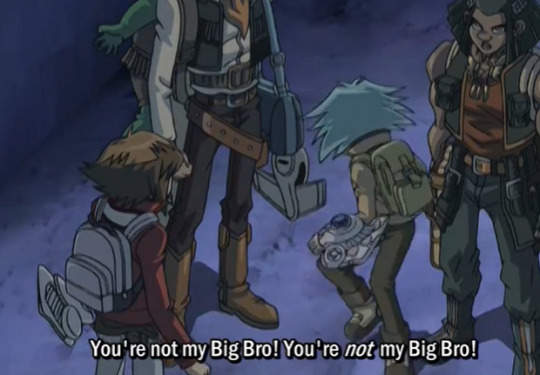
Judai's friends being taken away in circumstances out of his control is one thing, but the fact that Sho leaves him? That Sho sees the part of Judai's self that he's always been hiding and gives up on him. That rejection sends him spiraling, because all along Judai was driven by the same fear of rejection Yubel was.
When Judai reaches his breaking point, he externalizes all the trauma he held within. He starts sacrificing others for power, because he's convinced himself with his friends gone power is what he has left. Judai acts out that trauma on others, as Yubel does with Judai's friends.
In the end Yubel and Judai react the same way to being abandoned, they share the same flaws and the same fears.
Rejecting Yubel, villainizing them, despising them is an act of self-loathing for Judai. However, empathizing with them, understanding, trying to reach out a had to break the painful cycle between them - is Judai accepting himself.
Chemical Wedding
Judai and Yubel become their worst selves when they are alone, they walk parallel journeys in season 3 dragging down Judai to Yubel's level until at last they finally reunite.
This metaphorical union is a chemical wedding, of two opposites coming together. How Judai and Yubel's relationship changes throughout the narrative is vital to how they develop. Their bond develops each of their characters, until they integrate qualities of each other.
The final stage is called a wedding, it's not necessarily romantic but Yubel's 10,000 love confessions can certainly be interpreted that way.
Once again it's not really about what's healthy in a real life relatioship, it's a symbolic journey two characters take in a story. Yu-Gi-Oh Gx uses chemical weddings to develop the romantic relationship between Judai and Yubel.
(What about Bruno - I'll talk about him later next post. Please be patient, I can't cover everything in one post).
Here's another meta on the concept of chemical wedding's in general for a different show. The chemical wedding between Judai and Yubel is woven into the text in may ways.
The show is rife with direct references to alchemical imagery (references to medieval portraits, the solar king and the lunar queen)
A process of death ad rebirth they both undergo multiple times, until their last union where Judai says he might be destroyed by the attempt to fuse with super-poly but he doesn't mind).
The four elements are referenced in the clash between Judai and Yubel, Judai is fire and air - their favorite monster is flame wingman an air and fire hero combined. Yubel is water and earth, their entire deck has a plant motif).
The two of them literally fuse together into someone new. That act is what purifies Yubel's soul by uniting it with Judai, the process of alchemy is purifying metals until they forge gold.
Yubel is also literally a hermaphrodite, and by incorporating Yubel into themselves the two of them together become a hermaphroditic figure.
So that’s the role and importance of the chemical wedding. Pretty vague, right? But over the centuries the most common imagery has been a man and woman--often King Sol/Sulphur and Queen Luna/Mercury--1. standing together, 2. conjoined, or 3. combined into a hermaphroditic figure.
-In the Dictionary of Alchemical Imagery, Lyndy Abraham definition of chemical wedding.
The basic formula of a chemical wedding is the union of opposites (Fire and water, air ad earth, sun and moon, light and dark), that union creating a "Rebis", a figure that is both male and female. Judai and Yubel's journey takes them on a path to uniting as one.
It's a violent sometimes dangerous process as in each step dissolve et coagula occurs, in order to forge your better self you have to let your old self dissolved, which is sometimes a violent even painful process.
It's why Chemical Weddings often take the form of violent conflict. A conflict that threatens to destroy both parties.
The first chemical wedding is usually somewhat violent, primitive even, whereas the second one signifies the creation of the stone. However, characters can have more than two weddings (Hamliet).
Yubel and Judai have three violent confrontations in Season 3, before their final union of opposites take place. The three weddings are the three steps in their journey. It's also a process where both experience several metaphorical deaths, before finally their two souls unite into something new (which is why the ship is called Soulshipping).
SOULSHIPPING WEDDINGS - STAGE ONE
Alchemy is a process of continual death and rebirth. Yubel and Judai both go through two symbolic deaths, (the second one they die together to reforge themselves into something new).
Yubel's first death takes place sometime during season 1 and 2. The satellite containing them finally crashes back to earth, and Yubel burns up upon re-entry. Putrefecation, or Nigredo is the first stage of alchemy a process of boiling away all impurities, and it's associated with the element of fire, and associated with the color black. Yubel's spirit form of a black dragon comes out to protect them, and that burns away too. Nigredo is often signified with the death of a dragon.
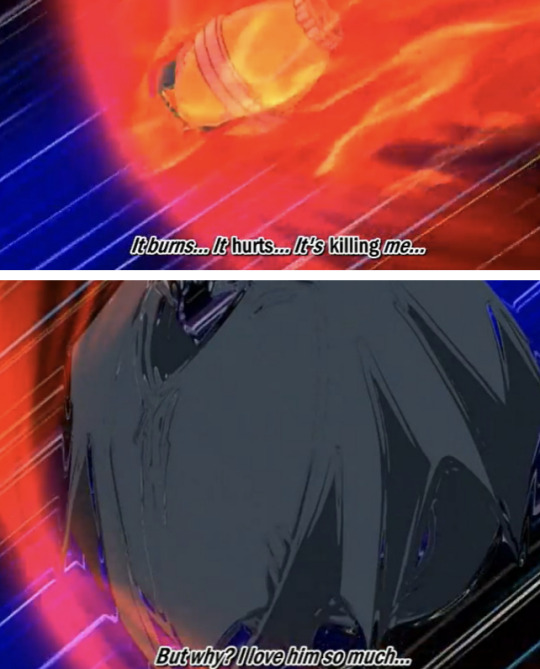
Yubel comes close to death, but their true death is metaphorical.
What Yubel truly experiences is the death of their old self, as the trauma they've endured makes someone new crawl out of the wreckage.
This is the moment onscreen where Yubel snaps and adopts their new philosophy of love, that love is sharing pain with someone else.
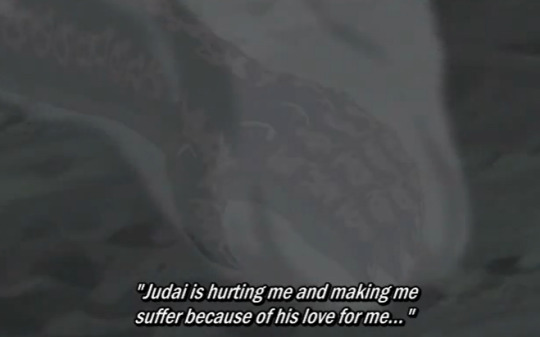
Yubel literally crawls out of earth, out of a crater that could have easily been the sight of their grave. However, their rebirth comes when Yubel reconstitutes themselves in time to meet Judai face to face a second time.
Yubel's true form is revealed then to be that of a rebis.
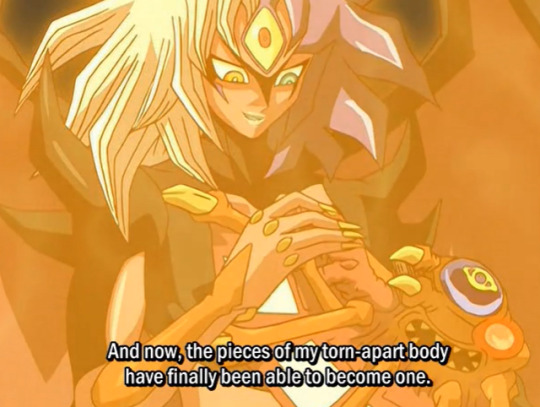
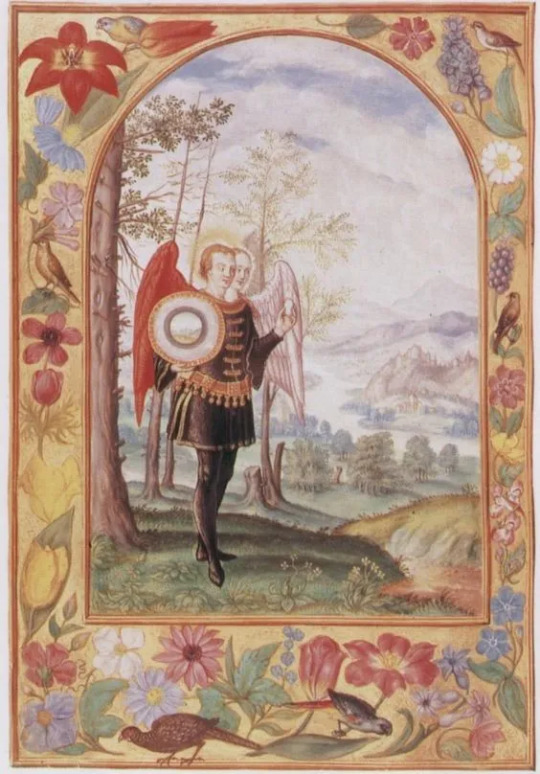
The head on the left is male, the wing attached to his side is red. The head on the right side is female; the wing attached to her side is white and in her hand she holds an egg. This figure is known as the Hermaphrodite, half man and half woman.
Yubel's design is a Rebis, split male and female down the middle. It's even implied in their backstory they were more masculine, and through an alchemical process to become a dragon altered their body to look as such, giving them several feminine traits.
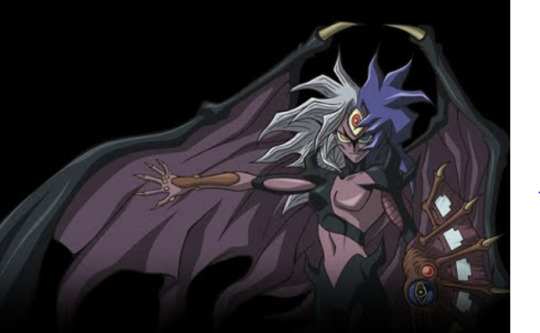
Yubel as one boob and one pec, speaks in two voices a deep masculine one and a light feminine one, defaults to using masculine "ore", but plays a feminine role to comparison Judai's more straighforward masculinity, they even have their face split one side being drawn with eyelashes. The image above is the hermaphrodite and the dragon, Yubel is both.
Yubel can be a reference to the greek story of the hermaphodite or the concept of the Hindu god "Ardanareshwara" which translates to "Lord wo is half woman." Likely both, they have a third eye on their forehead in the place of a bindi in traditional depictions of that god.
Ardanareshwara is the embodiment of the union of male and female energies in the universe, as well as the sacredness of marriage and copulation. [Mythcrafts]
The Splender Solis pictured above are images from the ripley scroll, a in alchemy text. There are 22 plates total, but plates 5-11 are called the parallels they reference the process of death and rebirth.
The seven parables are:
Plate 5 - Miners excavating a hill
Plate 6 - Philosophers beside a tree
Plate 7 - The drowning king
Plate 8 - Resurrection out of the swamp
Plate 9 - Hermaphrodite with an egg
Plate 10 - Severing the head of the king
Plate 11 - The bath
Season 3 goes through all seven, quickly covering the first two plate 5 is mining the Rainbow Dragon out of the side of a mountain, Philosophers beside a tree is Johan's deck using crystal tree, and also Judai awakens after Austin snaps him from his Haou phase underneath a tree.
Judai and Yubel's parallel journeyes reference plates 7-11, #9 was already pictured above.) They both experience two deaths, two rebirths, before their final third union.
Yubel's second death occurs here, at the hands of another dragon (Rainbow dragon is involved).
The first chemical wedding is usually somewhat violent, as metals need to be melted down and reforged through multiple steps in order to create a purer metal.
Judai definitely doesn't want to unite with Yubel their first encounter, they're at each other's throats, in fact Yubel specifically states they want violence, to share as much pain with Judai as possible.
Yubel ends the first wedding literally dissolving gain right in front of Judai's eyes, only to reforge themselves with Johan's body.
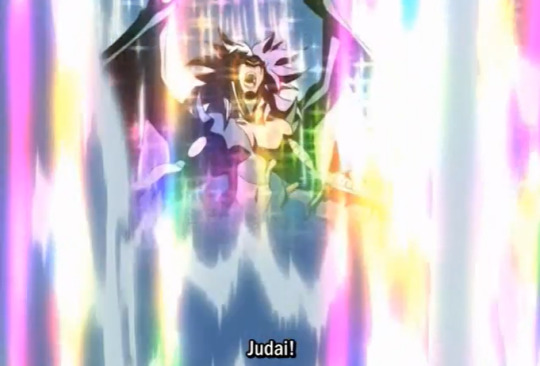
Those are Yubel's two deaths, and Judai's two deaths happen in parallel.
SOULSHIPPING WEDDINGS - STAGE TWO
Yubel is the process of two people breaking down, and mixing until they acquire each other's traits. Yubel pushing Judai down the path of becoming the supreme king, so they can be reunited again is exactly that.
Yubel's plan is to force drag Judai down to their level, so they can be reunited, and at that point Judai having walked a similar path and taken on traits of their can understand them, they tell Judai as much.
So when I solved the riddle you posed I was delighted. ANd that fueled my decision. I would try to fill the entire twelve-dimmension universe with my love towards you, Judai. And once I did, you would have to recognize my loev wouldn't you? That's why I sought to fill all those linked to you, your world, with sadness and anguish.
And my line of thinking wasn't wrong!
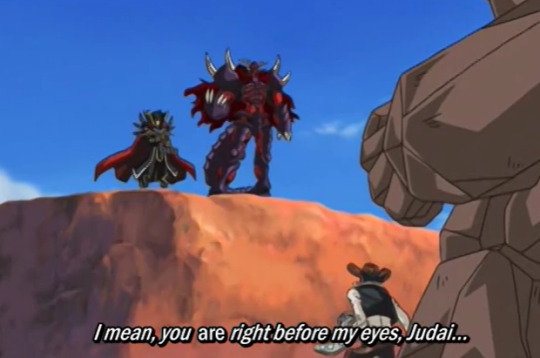
Judai has to go through a process of two deaths mirroring Yubel's own before he can reunite with them in their second wedding. Yubel even says, the first time they dueled didn't work out, because Judai hadn't awakened his darkness of the heart yet. Judai needed to take on Yubel's traits.
Judai's journey to Yubel is referenced by two Splender Solaris plates.
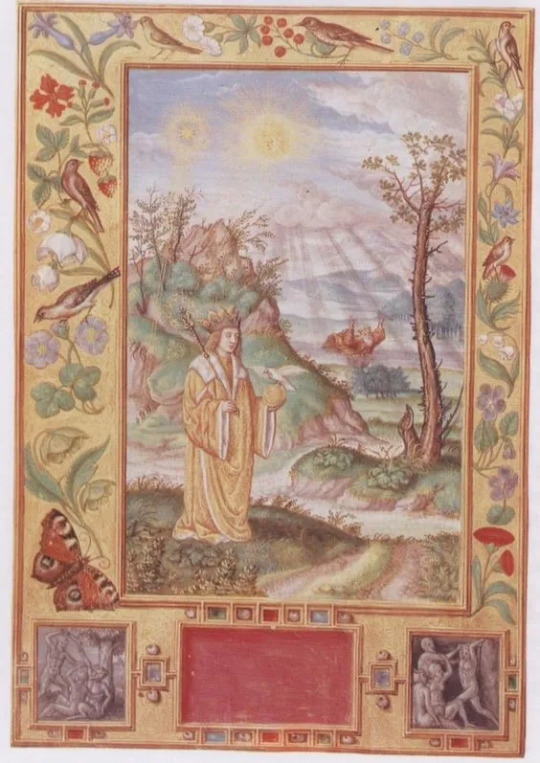
"The destruction of one thing is the birth of another " - Aristotle.
The plate depicts an old king drowning, and a new king being reborn at the same time.
The text describes to us how the old king was taken under, but then reborn the next day from the earth as the new king; the old king must die before the new king is born.
Judai's first death is his breakdown after Sho's rejection, he quite literally experiences a death or self, while at the same time rising up as the supreme king - but it's not a split personality or anything like that, merely an inversion. Judai once internalized their pain, now they externalize like Yubel. Yubel in acquiring darkness of the heart, Judai then begins to take on Yubel's traits, integrating facets of Yubel into themselves.
Within the stages of physical alchemy there is a set referred to as the drowning king; this is the dissolution step of the Nigredo process. This is when the alchemists would take their chemically calcified ashes and dissolve them into water.
Judai experiences the same Nigredo that Yubel does, as his old self dissolves away. Judai sinks into a mental landscape which is pictured as all black, while a new Judai the supreme king assumes his form out of the shadows. The new king has golden eyes, like the new king in the painting is dressed in gold.
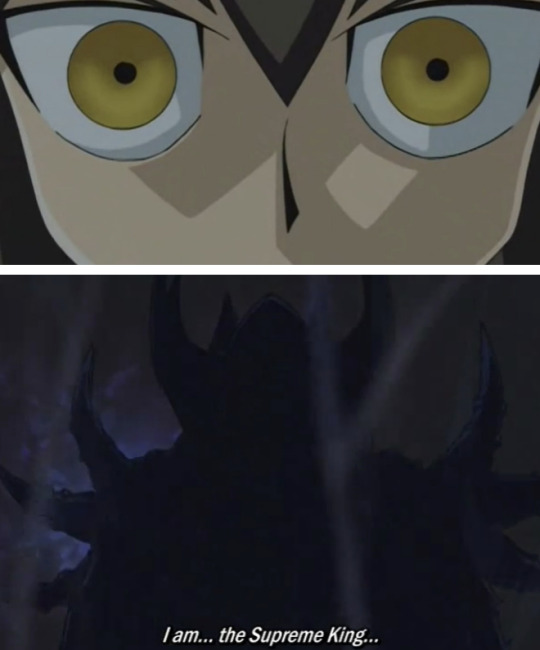
This is where Judai begins taking on parts of Yubel, not only do they lash out at innocent people as Yubel does, don a plate of armor to protect themselves (Judai has black armor, Yubel has impenetrable scales).
It's also a direct parallel to Yubel's experiences. Judai is left alone by the friends who he thought would always take his side and sinks into darkness. Yubel spends years alone in what they call "a capsule of darkness" in space after Judai's abandonment, sinking into denial because Judai couldn't possibly treat them this way when they love them so much.
Judai dies and is replaced by the supreme king, but the supreme king is a just a temporary stage in his development.
In order for Judai to heal he needs to be dismembered first, the Supreme King's head is torn off in a reference to Splendor Solis: Plate 10, severing of the head of the king.
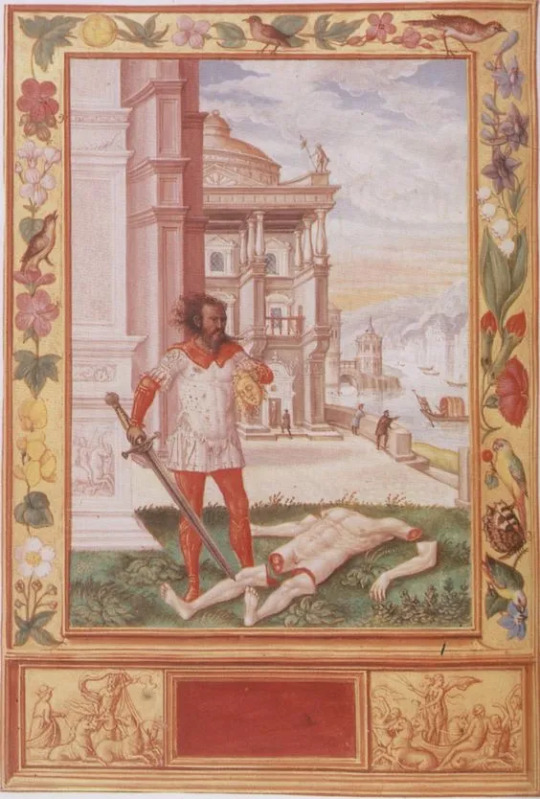
Alchemy is violent; the motto of Solve Et Coagula demands dissolution before rebuilding, tearing apart before putting back together. This idea applies to the material world as well as the spiritual realm; before the psyche can grow, it has to be ripped asunder.
The Supreme King is eventually stopped by Austin, they burn away in in fire, against a duelist with a flame deck, reduced to ash only to rise from the ash reborn like Yubel did out of the crater.
After the end of the duel, Judai's helmet is removed and thrown for all to see to signify the king's dismemberment.
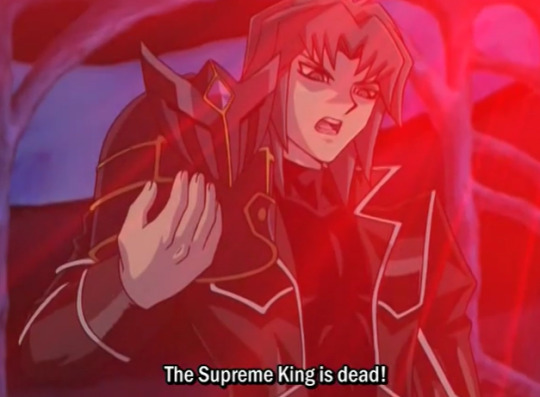
Judai now struggles to become someone new, as he cannot return to his previous state of innocence, but can't keep continuing on as the Supreme King. When Yubel and Judai reunite again Judai has taken on so many of Yubel's traits, they are mirror images of one another.
The second stage of alchemy is albedo, the word is taken from ablutio - the washing away of impurities. When Yubel and Judai meet for a second time, Judai's only priority is to cleanse Johan of Yubel's body, literally through purifying Rainbow Dragon in order to return Johan to his body.
His action in the duel is to destroy the "advanced darkness" field spell which changes Johan's crystal beasts, into darkness crystal beasts. First Nigredo, then Albedo, the prima materia is boiled in a flask where all impurities rise to the surface and make a thick black material, and then those impurities are washed away.
Cleansing Johan's soul doesn't go as intended for Judai however, because the only result is that Yubel reconstitutes themselves for a second time and faces Judai again in their true body.
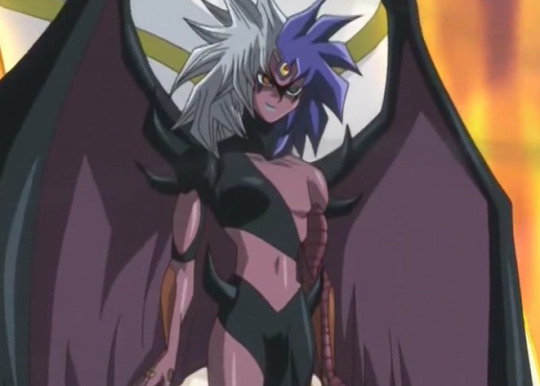
The cleansing turns from Rainbow Dragon from Black to White and both Yubel and Johan are purified into their true selves.At this point they've both experienced multiple deaths, they've both been torn apart and sewn back together again. However, they still have one stage to go.
The duel ends in a draw and they restart another duel facing each other this time, thus beginning the third and final wedding.
SOULSHIPPING WEDDINGS - STAGE THREE
The final wedding in a chemical wedding forges a philosopher's stone, and I bet you can't guess how this third wedding ends.
Everything so far has made use of the death and rebith imagery. Yubel and Judai grow closer each other through a violent union of opposites (extremely violent in this case ). They experience two metaphorical deaths as a part of their journey to finding each other.
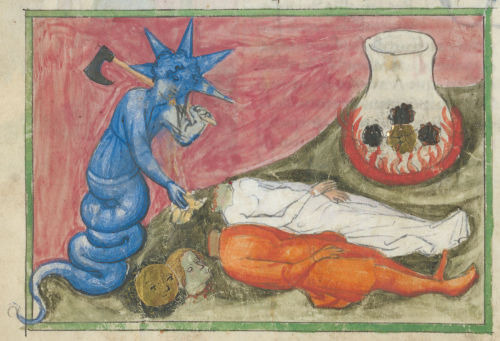
Death and Rebith is a major theme in the last duel, before they both experience their final death together, to become a new being together.
As I said above they've experienced several violent deaths, Yubel is ripped to pieces until they're nothing more than an arm, Judai experiences an ego death and reforms as the supreme king, before the supreme king's armor is torn off him.
In the third duel Yubel's signature monster experiences two deaths, only to be reborn again into stronger forms, yubel terror incarnate, and yubel the ultimate nightmare.
Yubel starts as a one headed dragon, their second form has two heads, their third they fuse with the dragon becoming the third head representing the three stages of alchemy. In the picture above the red, white and blue signify those three stages as well.
Judai and Yubel are also positioned as the Solar King, and Lunar Queen in their duel, just as in the alchemy painting above.
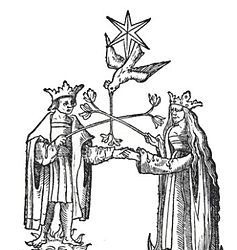
The above image image is taken from is called Rosarium Philosophorum–which literally means “rose garden philosophy. In this case I believe the anime writers are deliberately reference the "rose garden philosophy" name b/c even Yusei and Aki in 5Ds have a similar duel in a Rose Garden that parallels this duel - representing their union of opposites too.
The final duel between Judai and Yubel takes place in a rose garden, intentionally so. Yubel uses two rose themed cards, and their method of attacking and sharing pain nightmare pain revolves around lashing out with a vine covered in rose thorns.
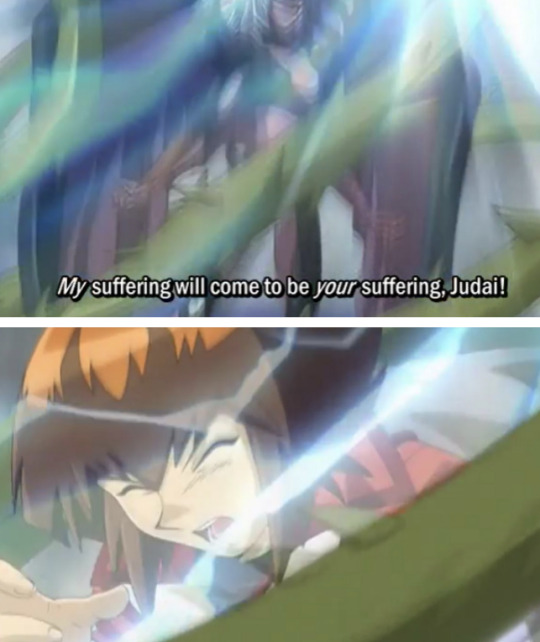
They're both entangled in the rose garden together, as Yubel says my suffering will become your suffering, Judai. Yubel isn't immune to pain they suffer alongside him, for Judai hurtng Yubel is an act of hurting himself. That's also a reference to the ouroboros, the snake biting it's own tail is a common symbol associated with initiating the alchemical process.
Judai has taken so many traits of Yubel at this point they are inseparably intertwined, there's no telling where Judai ends and Yubel begins so any damage Judai attempts to do is dealt to himself as well.
Standing together in the garden Judai assumes the role of the solar king, and Yubel the lunar queen.
Yubel's machinations were to make Judai ascend into a king, Judai is referred to as being like the sun by Sho drawing everyone in.
Bro... Bro, you're too selfish. Before now, I thought of you as the sun. Someone who gave others energy and made the impossible, possible.
Yubel is the moon which orbits around Judai. There's the time they spent in a literal satellite, floating in space among the stars to signify this. Yubel even drops a reference to the myth of Endymion. A story where Selene, the titan of the moon fell in love with a young boy and asked for them to fall asleep and stay young in their sleep forever so they could gave upon them lovingly as they slept.
I will take you to a distant dimmension, where no one will ever reach you. There I will watch over you as you sleep forever.
Once again Judai is fire, and Yubel is mainly plant themed. Judai assumes a masculine role, Yubel after transforming into a Rebis changed their body to take on feminine traits. Judai is the holder of the gentle darkness, Yubel is corrupted by the light of destruction which is engaged in a battle with the gentle darkness.
Theirs is a violent union of opposites, they are literally trying their best to kill each other.
Yubel frames themself as the selfless protector of Judai like a knight or servant, but their obvious desire is to stand together with Judai and be on the same level with him (hence dragging him down).
They spend a duel against Amon reviling him for how easy Amon could throw Echo away, because ultimately Amon is the king, and therefore Echo is beneath him. In fact Yubel was content to just sacrifice their body like Echo and serve as a protector in a previous life, until prince Judai offered Yubel their eternal love, giving something in return and elevating to them as equals.
So Yubel's primary goal is to be by his side, to be lunar queen to his solar king.
In order to accomplish this the art depicted above has to happen, they both have to dissolve, experience a death and become something new together.
Judai even explicitly tries very hard to kill Yubel, saying they'll use the power of the supreme king to erase them from the universe. Yubel similarly, rejected one too many times responds to violence with violence. Their union is inherently marked by violence. However, it's what brings them to a closer understanding of each other.
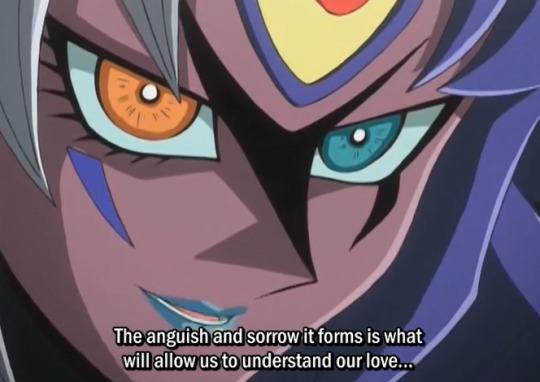
However, while violence brings them closer together, it eventually has to transform into a a union.
As they reach the final stages of the duel, Yubel states to Judai they finally understand that Judai has chosen to respond to all of their love with hate (once again union of opposites, love and hate). At the same time a wind begins to blow, elemental symbolism occurs as the wind and clouds appear in a process of "sublimation", and Judai's past is revealed to him, and he realizes his memory of his past life of the Supreme King.
Sublimate appears as a term for a mineral deposit, by analogy to the alchemical process: minerals in a vapor state, thrown up from the interior of the earth.
The introductory of the element of air also signifies Yubel and Judai moving from Citrinatis, the yellowing, signified by earth to Rubedo the final stage where the philosopher's stone is forged. Judai and Yubel's first duel takes place in a desert (earth), their second they climb high into the sky, and their third they climb even higher until they are standing above the clouds fighting in an arena of air.
Sublimation is a whole new experience of self and reality, both being redefined. Judai's reconciliation isn't just Yubel, it's with the three faces of himself Prince Judai, Regular Judai, and Haou / Supreme King. These memories lead to Judai's eventual decision, to propose a union. This union takes place as the last chemical wedding, which is also a real wedding in everything but name.
Their entire duel contains elements from both japanese and jewish weddings (the three phantasms that Yubel utilizes in the duel against amon are based off of three kabbalistic angels so the jewish symbolism has already been used before).
A traditional Jewish wedding starts with drawing up a marriage contract (Spell Chronicle), and the bride paying out a dowry (the five cards Yubel banishes at the start of the duel). The wedding must be observed by a minimum of two witnesses (Shou and Ojama Yellow). During the wedding the bride circles the groom seven times (Yubel makes 7 successful attacks on Judai between their 3 forms, all others were negated in some way). At the end of the ceremony, the groom presents the bride with a ring (Judai giving Yubel Super Fusion), and a glass is broken to the cry of “Mazel tov!” (the glass window breaking in Samejima’s office). Finally the ceremony isn’t considered complete until the bride and groom retire away from everyone to ... consumate the marriage (Judai and Yubel leaving together).
Source [HERE]
Judai attempts to use super polymerization card to start the process of alchemy (fusing the 12 dimmensions - there are 12 steps to Alchemy). However, Judai announces that the two of them are going to fuse together.
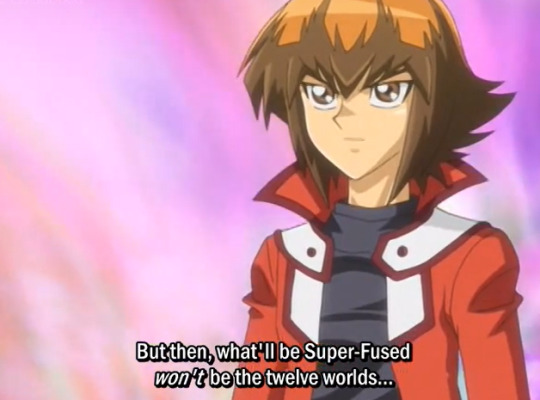
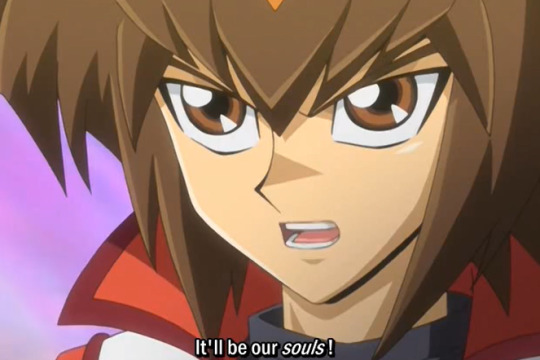
Judai and Yubel's quite literal fusion into one being is the formation of a hermaphrodite. From the essay of "Get your Gender On, Jaden Yuki and Yubel",
Art historian Arturo Schwarz argues that “the Great Work is but a metaphor” in which alchemists don’t create a Rebis but become a metaphorical Rebis themselves, as Judai does over the course of the series. By joining his soul with Yubel’s through “Super Polymerization,” he arguably becomes nonbinary like them. Even before literally fusing with Yubel, he gains “aurea apprehensio (golden awareness) of this marvelous reality: we are gods, because we all are man and woman at one and the same time.”
Hermaphordadites are a recurring symbol in a lot of greek mythology, the name comes from Hermaprhoditus a son of Hermes and aprhodite originally born male. A female nymph fell in love swam to him in a pool and wound herself tightly around his body and begged the gods to never tear them apart creating the co-joined male and female figure the hermaphrodite. The parallels to Yubel and Judai are present, especially in them becoming entangled in one another.
One origin story for humanity is also that human beings were originally two headed, four armed, and four legged beings, combination of men and women, men and men, and women and women. However, they were torn apart into two seperate beings, and forever doomed to go searching and be reunited with their second half.
When opposites are finally reconciled, the great hermaphrodite is formed. Judai even refers to this as an act of finally purifying the light's corruption from Yubel's soul by uniting it with the supreme king's soul. The union is a purifying process, and the end of Yubel and Judai's long journey of losing each other and finding each other again.
However, in order to be purified they have to both let their old selves die in order to form something new, the final death but one they experience together. Just like the painting of the dismemberment of the solar king and lunar queen, they need to be torn apart and sewn back together again.
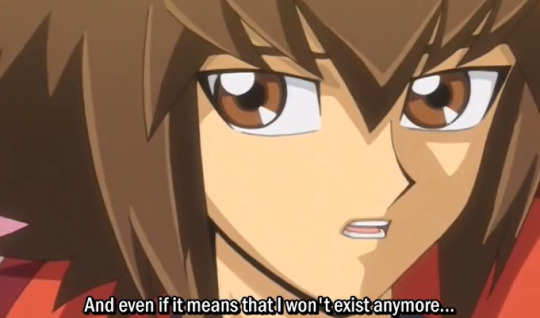
I don't care.
Yubel is finally moved, and all the anger between them is washed away by tears as they're finally allowed to grieve (as death is central to alchemy, so is grief, both are parts of life).
To signify the end of this journey, Judai falls to earth the same way Yubel did at the start of their story. However, while Yubel was suffering, all alone, this time Judai and Yubel are together.
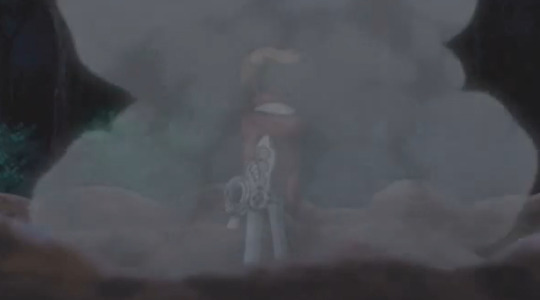
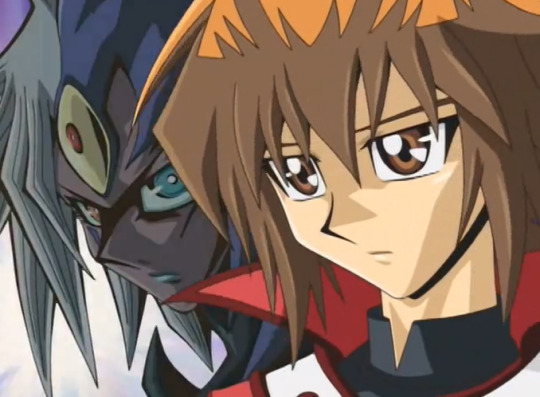
#yu gi oh gx#yu-gi-oh gx#judai yuki#yubel#soulshipping#yu gi oh gx meta#ygx meta#alchemy#jaden yuki#ygo meta
102 notes
·
View notes
Text

the Mother of All Waters begins her Tantra:
“Know that my worship is of Flesh
All else is abstract, obtuse and as dust.
Flesh of Flesh is sacred to me
My Yoni
And Stars:
The points of Connection & the Wheels of Configuration of release…
“Sex in all its infinite forms is Shakti as restless and endless as the Ocean about you
As the tidally-sparked blood within your Flesh
Ever flowing, ever seeming to encompass All Things
Ever filling and settling into All Spaces
Sex is my Mantra, my Spell, My Siren Cry
And it is I who always answer this cry,
it is the glory of my Flesh that suffuses the Mystery
And the release of Orgasm that calms the turbulent Ocean that is also I.
You see me as a Mirror Image of All, so as to mate with me
And so become whole.
Mystery of Anima & Animus
Flesh & Spirit
Nu & Hadit
And the restless Shakti ripples
Called Heru
Pan & Babalon reveal this ageold Mystery
As do Shiva & Shakti
Yin & Yang
And every archetypal dyad eternally mating
Melding
Into One
Great Ocean of Bliss
Becoming
Nun…."
~ The Book of Shakti-Babalon
IN NOMINE BABALON🥀
#divine feminine#shakti#sex magick#occult#occult art#dark mother#dark art#goddess#babalon#ophidian#thelema#esoteric#tantra#INBVSM
196 notes
·
View notes
Text
And how can we know the whole of which we are only a part?
Carl Jung Depth Psychology Facebook Group
So the Self is part of the collective unconscious, but it is not the collective unconscious; it is that unit which apparently comes from the union of the ego and the shadow.
We designate that totality as the Self, where everything conscious is united with everything unconscious, with the exception of those things that reach beyond our limitation in time…

View On WordPress
#AnalyticalPsychology#Anima#Animus#Archetype#Buddha#Carl Jung#Christ#CollectiveUnconscious#Consciousness#DepthPsychology#Dreams#Ego#FairyTales#Freud#God#Individuation#Introvert#Jung Alchemy#Jungian#Mysticism#Myth#Mythology#Persona#Psyche#Religion#Shadow#Spirituality#Types
3 notes
·
View notes
Text

Look at man, the weak one in his wretchedness and torment, whom the Gods have singled out as their quarry- tear to pieces the bloody veil that the lost soul has woven around you, the cruel nets woven by the death-bringing, and take hold of the divine whore who still cannot recover from her fall from grace and in raving blindness craves filth in which to throw herself.
~Carl Jung, The Black Books, Vol. V, Page 259
3 notes
·
View notes